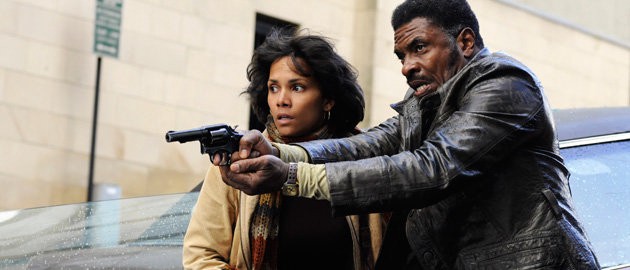I was belatedly watching “Cloud Atlas” at my local Cineplex, catching up on movies that I hadn’t seen because, thanks to Hurricane Sandy, I no longer had my Manhattan to upstate NY umbilical cord. I hadn’t read all the reviews when “Cloud Atlas” premiered in Toronto because, as I recently told Steven Gaydos, executive editor at Variety, “I see the movie and then I decide.” But this was a case where the gaseous critical response to “Cloud Atlas” had wafted in my direction, a skepticism and negativity reflected in Rotten Tomatoes’ stingy 63 percent fresh. So, I’d postponed seeing an adventure that was completely radical among contemporary American films in the gleeful, optimistic way it played musical chairs with male and female, young and old, and future and past. By creating a movie that starred Tom Hanks, Halle Berry, and Huge Grant and blurred the boundaries between men and women, the Wachowski siblings (Andy and Lana), and Tom Tykwer, adapting David Mitchell’s genre-busting best-seller, took some major risks. And they created an entertaining, ambitious movie that went beyond feminism to an all-embracing humanism that wasn’t naive enough to believe that evil didn’t walk the earth in wingtips or stilettos or bare feet.
Oscar winner Berry portrays six characters. In two key roles, as a crusading journalist in 1970s San Francisco and as a futuristic space traveler on a rescue mission, she gets not one but two unapologetically independent female characters. Both are proactive in fighting for good. In old-school terms, these characters are self-reliant rather than dependent on men. It’s also likely that in other eras, their souls existed in male form, which adds to their complexity. They are good not because they are female but because they are righteous. And Berry, at one point, crosses the gender boundary, sporting a Fu Manchu mustache as a man.
The same fluidity exists in taking the charming image of Grant, the boyish romantic hero and constantly remaking him as a villain in six very different roles, from man of the cloth to corrupt capitalist to cannibal chief. The movie constantly turns sexual images inside out, male and female. Take a chatty Oxbridge toff and put him in extreme horrifying war paint atop a similarly painted pony trolling for the other, other white meat, and you’ve undone his image forever. And that’s a good thing. Through cracking the surface of the male romantic comedy lead, you liberate the actor underneath.
All these years, Grant has typically been playing accepted versions of himself when he was capable of playing a cannibal. Who knew? What all this shape-shifting means — and there are many more examples — is that the boundary between actor and actress also disappears. Hugo Weaving can be a gun-wielding assassin in the Seventies, or a latter-day Nurse Ratchet in wig, white uniform and sensible shoes in contemporary England, and he’s still rotten to the core. Either way, for Weaving, it’s all an act.
In the “Cloud Atlas” universe, the us-versus-them split that often characterizes Hollywood discussions about women is beside the point. In the six narrative threads braided into the film, the boundary is not between male and female but between good and evil. Those who enslave, exploit, or degrade are not restricted to a specific sex (or age or race), and they write their fates with their actions. It’s up to those who salvage, fight against injustice, and create to remake the world every day and in every generation. The chaos between these elements, the dynamic, is what makes all the variety that is life in the past, present, and future. Today, you may be a sister fighting bitterly with another sister (I am!); in your next life, you might be married to that person (eek!). The trick is to resolve the conflict and to understand that the battle isn’t between male and female but between darkness and light, extermination and survival.
Looking back at the mixed reception “Cloud Atlas” received when it premiered at Toronto, I understand that it’s easy to laugh at the awkward prosthetic teeth worn by Hanks as he switches from one character to the next, or the silly Jar Jar Binks dialect he speaks in a postapocalyptic future. But that’s a distraction from the movie’s core intelligence. Susan Sarandon, who plays a variety of characters, including a New Age-y abbess, has a key snippet of narration where she says: “Our lives are not our own. We are bound to others, past and present. And by each crime and every kindness, we birth our future.” In an original interview for Yahoo! Movies last August, Sarandon explained: “Everything good and everything bad earns you your next phase of life. ‘Cloud Atlas’ takes place over different time periods, genders, and colors and still connects somehow. … What you do in one life counts to form the future.”
What makes this 21st-century movie count in contemporary culture is the extraordinary way in which “Cloud Atlas” connects men and women and radicalizes sexual politics in film.
_____________________________________
Thelma Adams is Contributing Editor, Yahoo! Movies, twice chair of the New York Film Critics Circle, and the author of Playdate, an Oprah book pick.
Printed with permission of the author.






